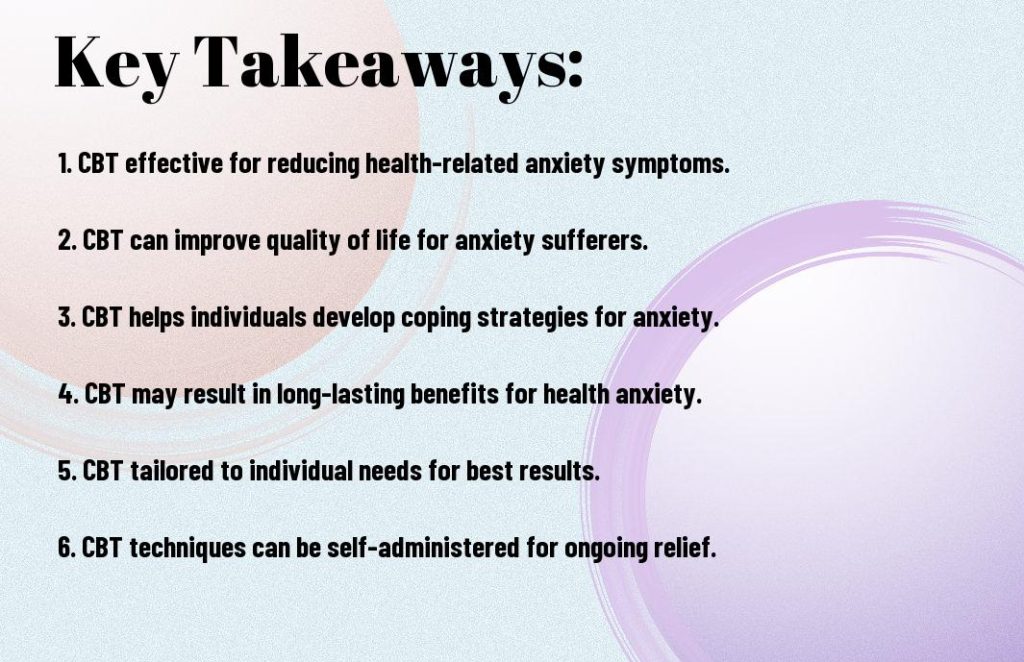Therapy for health-related anxiety is a topic of great interest and importance in the field of mental health. Cognitive-behavioral therapy (CBT) has been widely recognized as a highly effective treatment approach for individuals struggling with health-related anxiety.
Research has shown that CBT can help individuals to identify and challenge maladaptive thought patterns and behaviors that contribute to their anxiety, ultimately leading to significant improvements in their mental well-being.
Individuals who have health-related anxiety often experience intense fear and worry about their health, which can significantly impact their daily lives.
CBT equips individuals with practical tools and strategies to cope with these fears, such as cognitive restructuring and exposure therapy.
By addressing the underlying beliefs and behaviors that fuel health-related anxiety, CBT can empower individuals to regain control over their thoughts and emotions, ultimately leading to a better quality of life.
Stay tuned as we examine deeper into the effectiveness of CBT for health-related anxiety in this blog post.
Table of Contents
Key Takeaways:
- Cognitive-Behavioral Therapy (CBT) has been found effective in treating health-related anxiety.
- CBT helps individuals recognize and change negative thought patterns associated with health concerns.
- CBT equips individuals with coping mechanisms to manage health-related anxiety symptoms.
- CBT can be tailored to address specific health-related fears and anxieties of each individual.
- CBT is a widely used and evidence-based therapy for addressing health-related anxiety with proven effectiveness.
The Prevalence of Health-Related Anxiety
Defining Health-Related Anxiety and Hypochondria
Some individuals experience heightened levels of anxiety related to their health, which can manifest as a specific condition known as health-related anxiety or hypochondria.
People dealing with health-related anxiety often have persistent worries about their health and may frequently seek reassurance from medical professionals or excessively research symptoms online.
This excessive concern can significantly impact their daily lives, leading to heightened stress levels and impaired functioning.
Statistics on Health Anxiety in the General Population
Defining the prevalence of health-related anxiety in the general population is crucial for understanding the scope of this issue.
It is estimated that approximately 4-6% of the population suffers from health anxiety, with varying degrees of severity.
Research shows that women are more likely to experience health-related anxiety compared to men, and individuals with a history of medical conditions or a family history of anxiety disorders may be at a higher risk.
Fundamentals of Cognitive-Behavioral Therapy
It is important to understand the basic principles of Cognitive-Behavioral Therapy (CBT) when exploring its effectiveness in treating health-related anxiety.
CBT is a psychotherapeutic approach that focuses on the interconnected relationship between thoughts, emotions, and behaviors.
The fundamental principle of CBT is that our thoughts and beliefs influence our feelings and behaviors, which can then impact our physical and mental health.
Key Principles of CBT
To effectively implement CBT for health-related anxiety, therapists work with individuals to identify and challenge negative thought patterns and beliefs that contribute to anxiety symptoms.
This process involves recognizing cognitive distortions, such as catastrophizing or overgeneralization, and replacing them with more realistic and balanced alternatives.
By addressing these maladaptive thinking patterns, individuals can learn to manage their anxiety more effectively and improve their overall well-being.
CBT Techniques and Approaches
Any successful CBT intervention involves the use of various techniques and approaches to help individuals overcome health-related anxiety.
These may include cognitive restructuring, which involves challenging and reframing negative thoughts, behavioral experiments to test the validity of beliefs, relaxation exercises to manage physical symptoms of anxiety, and exposure therapy to confront feared situations gradually.
The combination of these techniques aims to help individuals develop coping strategies and achieve lasting changes in their thoughts, emotions, and behaviors.
With a tailored approach that addresses individual needs and preferences, CBT has been shown to be highly effective in reducing health-related anxiety and improving overall quality of life.
By understanding the key principles and techniques of CBT, individuals can gain valuable insights and skills to manage their anxiety symptoms and enhance their well-being.
Mechanisms of CBT in Addressing Health Anxiety
Cognitive Restructuring and Health Anxiety
All thoughts, including those related to health, can greatly influence feelings and behaviors. Cognitive restructuring is a key component of Cognitive-Behavioral
Therapy (CBT) that involves identifying and challenging irrational or exaggerated thoughts that contribute to health-related anxiety. By working with a therapist, individuals can learn to recognize and reframe catastrophic thinking patterns that fuel their anxiety.
This process helps them develop a more balanced and realistic perspective on their health concerns, reducing unnecessary worry and fear.
Exposure Therapy for Health Anxieties
The exposure therapy component of CBT involves gradually confronting feared situations or stimuli related to health concerns. This exposure is conducted in a controlled and safe environment, allowing individuals to experience anxiety and learn that their fears are often exaggerated or unfounded.
Through repeated exposure, individuals can habituate to anxiety-provoking situations and build confidence in their ability to cope with discomfort. This process can lead to a significant reduction in avoidance behaviors and the associated anxiety related to health worries.
Anxiety disorders, including health-related anxiety, are often characterized by avoidance behaviors that serve to temporarily reduce distress. However, in the long term, avoidance can reinforce the belief that the feared situation is truly dangerous.
CBT addresses this through exposure therapy, which encourages individuals to confront their feared situations in a gradual and systematic way.
By breaking the cycle of avoidance and confronting fears, individuals can learn to tolerate uncertainty and discomfort, ultimately reducing the grip that anxiety has on their lives.
Behavioral Experiments and Response Prevention
One of the key strategies used in CBT for health anxiety is the implementation of behavioral experiments and response prevention techniques.
These techniques involve testing out beliefs and predictions related to health concerns in a systematic and evidence-based manner.
By engaging in these experiments, individuals can gather new data that challenges their anxiety-driven assumptions and perceptions.
Additionally, response prevention techniques help individuals resist rituals or safety behaviors that maintain their anxiety, allowing them to learn that anxiety will naturally decrease over time without these protective actions.
Efficacy of CBT for Health-Related Anxiety
Review of Clinical Research and Trials
Efficacy of Cognitive-Behavioral Therapy (CBT) for health-related anxiety has been extensively studied through clinical research and trials.
These studies have consistently shown that CBT is an effective treatment for individuals experiencing health-related anxiety disorders.
CBT helps individuals identify and challenge irrational beliefs and thought patterns that contribute to their anxiety, leading to significant reductions in anxiety symptoms and improved overall well-being.
Meta-Analyses and Systematic Reviews
With the growing body of research supporting CBT for health-related anxiety, numerous meta-analyses and systematic reviews have been conducted to further evaluate its effectiveness.
These comprehensive analyses have confirmed that CBT is a highly effective intervention for health-related anxiety, with results showing significant reductions in anxiety levels post-treatment.
Another crucial aspect highlighted by these meta-analyses and reviews is the durability of the effects of CBT for health-related anxiety.
Studies have shown that individuals who undergo CBT not only experience immediate relief from anxiety symptoms but also maintain these benefits in the long term.
Long-term Outcomes of CBT for Health Anxiety
Health-related anxiety can have a significant impact on an individual’s quality of life and overall functioning.
Research on the long-term outcomes of CBT for health anxiety has demonstrated its effectiveness in providing sustained relief and preventing relapse.
Individuals who engage in CBT typically report better coping strategies, reduced anxiety levels, and improved health-related behaviors even months or years after treatment.
The enduring benefits of CBT for health anxiety highlight the importance of early intervention and ongoing support for individuals struggling with health-related anxiety disorders.
By addressing underlying cognitive distortions and behavioral patterns, CBT equips individuals with the tools they need to effectively manage their anxiety and lead healthy, fulfilling lives.
Comparing CBT to Other Therapeutic Approaches
Many individuals who suffer from health-related anxiety often seek out different therapeutic approaches to manage their symptoms.
It is vital to evaluate the effectiveness of Cognitive-Behavioral Therapy (CBT) in comparison to other commonly used treatments to determine the best course of action for these individuals.
| Pharmacotherapy | CBT |
| Pharmacotherapy involves the use of medications to manage symptoms of health-related anxiety disorders. While medications can provide temporary relief, they may not address the root causes of anxiety and can have side effects. | Cognitive-Behavioral Therapy focuses on changing negative thought patterns and behaviors that contribute to health-related anxiety. It equips individuals with coping strategies and tools to manage their anxiety in the long term. |
Pharmacotherapy vs. CBT
Pharmacotherapy may offer quick relief from symptoms of health-related anxiety, but it often does not provide a sustainable solution.
In contrast, CBT targets the underlying causes of anxiety, leading to long-lasting improvements in mental health outcomes.
By empowering individuals to identify and challenge irrational beliefs about their health, CBT can effectively reduce anxiety levels and enhance overall well-being.
Alternative Therapies and Their Effectiveness
To explore alternative therapies for health-related anxiety, individuals may consider options such as mindfulness meditation, yoga, acupuncture, or herbal remedies.
While these approaches may complement traditional treatments like CBT, their effectiveness varies among individuals. It is vital to consult with a healthcare provider before incorporating alternative therapies into a treatment plan for health-related anxiety.
With a growing interest in holistic approaches to mental health, individuals are increasingly turning to alternative therapies to manage health-related anxiety.
While CBT remains a cornerstone in treating anxiety disorders, integrating alternative therapies can provide individuals with a comprehensive approach to managing their symptoms and improving their overall quality of life.
Implementing CBT in Various Settings
CBT for Health Anxiety in Individual Therapy
Anxiety disorders are common and can have a profound impact on individuals’ quality of life. Cognitive-behavioral therapy (CBT) has been shown to be effective in treating health-related anxiety when delivered through individual therapy sessions.
In this setting, a therapist works one-on-one with the individual to identify and challenge the negative thought patterns and beliefs that contribute to their health anxiety.
Group-Based CBT Interventions
Group-based CBT interventions for health anxiety offer a cost-effective and efficient way to provide treatment to multiple individuals simultaneously.
In a group setting, participants can benefit from the support and insight of others facing similar challenges.
Group interventions often include educational components, skill-building exercises, and opportunities for participants to practice new coping strategies in a supportive environment.
Research has shown that group-based CBT interventions can be just as effective as individual therapy in reducing health-related anxiety symptoms.
They also have the added advantage of fostering a sense of community and belonging among participants, which can further aid in the recovery process.
Digital and Remote CBT Platforms for Health Anxiety
Implementing digital and remote CBT platforms for health anxiety offers a convenient and accessible way for individuals to receive evidence-based treatment.
These platforms may include online therapy sessions, mobile apps, or self-help programs that guide users through CBT techniques and exercises from the comfort of their own homes.
By leveraging technology, individuals can access support and treatment whenever and wherever they need it.
To ensure the effectiveness and safety of digital and remote CBT platforms, it is important for providers to adhere to best practices in telehealth and data security.
Additionally, ongoing monitoring and support should be available to participants to address any questions or concerns that may arise during the course of treatment.
Challenges and Limitations in CBT for Health Anxiety
Identifying Barriers to Effective CBT
Despite the proven efficacy of Cognitive-Behavioral Therapy (CBT) for health-related anxiety, there are challenges that can hinder its effectiveness.
One key obstacle is the difficulty in identifying the barriers that prevent patients from fully benefiting from CBT.
Some individuals may struggle to engage in the therapy due to factors such as resistance to change, fear of facing their anxiety, or a lack of insight into their thought patterns.
Addressing Non-Responders to CBT
On the other hand, another significant challenge in using CBT for health anxiety is the issue of non-responders. Despite the structured nature of CBT, some individuals may not show significant improvement in their symptoms after undergoing the therapy.
One possible explanation for this lack of response could be the presence of underlying issues that are not effectively addressed by traditional CBT techniques.
One approach to addressing non-responders to CBT is to tailor the therapy to the specific needs of the individual.
This may involve incorporating additional techniques or interventions that target the unique factors contributing to the individual’s health anxiety.
By customizing the treatment plan, therapists can increase the chances of success for non-responders and help them overcome their anxiety.
Another strategy for dealing with non-responders is to explore alternative therapeutic approaches that may be more suitable for individuals who do not benefit significantly from traditional CBT.
This could involve integrating elements of other therapeutic modalities, such as mindfulness-based interventions or acceptance and commitment therapy, to provide a more comprehensive and personalized treatment plan for individuals struggling with health-related anxiety.
Patient Considerations and Adaptations of CBT
Tailoring CBT to Individual Needs
To ensure the effectiveness of Cognitive-Behavioral Therapy (CBT) for health-related anxiety, it is crucial to tailor the treatment to individual needs.
This involves considering the unique circumstances, preferences, and challenges of each patient. By customizing the CBT approach, therapists can address specific anxieties, cognitive distortions, and behavioral patterns that contribute to the patient’s health-related concerns.
Cultural and Demographic Factors in CBT Efficacy
On the journey to addressing health-related anxiety through CBT, it is imperative to recognize the impact of cultural and demographic factors on treatment efficacy.
Cultural beliefs, societal norms, and experiences shape an individual’s perception of health and illness. Therapists must be sensitive to these influences to adapt CBT strategies effectively.
- Understanding the patient’s cultural background can help therapists incorporate appropriate language, examples, and metaphors that resonate with the individual’s belief system.
- Acknowledging demographic factors such as age, gender, and socioeconomic status can guide therapists in tailoring treatment goals and strategies to suit the patient’s needs and context.
Tailoring CBT to Individual Needs
Tailoring CBT to address cultural and demographic factors involves modifying therapeutic techniques to align with the patient’s worldview and life circumstances.
By integrating cultural competence into the therapeutic process, therapists can foster a more trusting and collaborative relationship with the patient. This, in turn, enhances the overall efficacy of CBT in addressing health-related anxiety.
- Recognizing cultural differences in communication styles, coping mechanisms, and help-seeking behaviors can inform treatment planning and interventions.
- Knowing how to navigate cultural taboos and sensitivities ensures that therapeutic discussions remain respectful and relevant to the patient’s experiences.
This chapter underscores the importance of patient-centered care in the application of CBT for health-related anxiety.
By tailoring treatment approaches to individual needs and being mindful of cultural and demographic influences, therapists can optimize the outcomes of CBT interventions.
Ultimately, a personalized and culturally sensitive approach enhances the efficacy of CBT and promotes better mental health outcomes for patients dealing with health-related anxiety.

Summing up
Overall, Cognitive-Behavioral Therapy has shown to be a highly effective treatment for health-related anxiety.
Through its focus on changing distorted thoughts and behaviors, individuals are able to better manage their anxiety symptoms and improve their overall well-being.
The structured nature of CBT provides clear strategies for coping with health-related worries, leading to long-lasting improvements in anxiety levels.
It is important to note that individual experiences may vary, and some may require additional or alternative forms of therapy.
However, the evidence supporting the effectiveness of CBT for health-related anxiety is robust, making it a recommended treatment option for those struggling with excessive worry about their health.
Seeking out a qualified therapist who specializes in CBT can offer individuals the support and tools they need to successfully overcome their health-related anxiety and lead a more fulfilling life.
FAQ
Q: What is Cognitive-Behavioral Therapy (CBT)?
A: Cognitive-Behavioral Therapy (CBT) is a type of psychotherapy that focuses on changing negative thought patterns and behaviors to help individuals better cope with their emotions, thoughts, and behaviors.
Q: Is Cognitive-Behavioral Therapy effective for health-related anxiety?
A: Yes, Cognitive-Behavioral Therapy (CBT) has been found to be highly effective in treating health-related anxiety. It helps individuals identify and challenge irrational thoughts about their health, leading to a reduction in anxiety symptoms.
Q: How does Cognitive-Behavioral Therapy help with health-related anxiety?
A: Cognitive-Behavioral Therapy (CBT) helps individuals with health-related anxiety by teaching them coping skills to manage their anxiety symptoms. It also helps in changing negative thought patterns related to health concerns, leading to a decrease in anxiety levels and an improvement in overall mental well-being.






